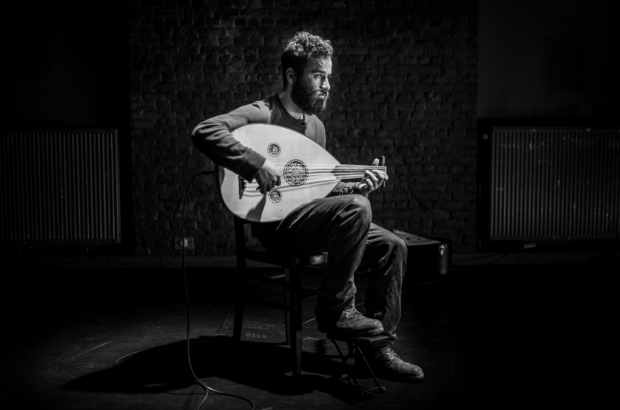- Daily & Weekly newsletters
- Buy & download The Bulletin
- Comment on our articles
Brussels concert halls celebrate universal language of migration
Referring to refugees as if they are one coherent group makes us forget that there are as many individual stories as there are people. World Refugee Day on 20 June serves as a reminder of that, with commemorative concerts, lectures and exhibitions organised throughout the world.
While the refugees may have faded from the headlines of the Flemish media, they haven’t from the hearts of local artists. To celebrate a common bond, Brussels Jazz Orchestra (BJO) and Ancienne Belgique have organised the benefit Artists #withRefugees.
BJO finds World Refugee Day “an initiative that deserves attention,” says the band’s artistic director Frank Vaganée. “Art has to be rooted in society. Moreover, jazz is one of the rare musical forms that blends easily with other musical cultures.”
On World Refugee Day, everyone works for free, he stresses. “All the proceeds go to Music Fund, an organisation that collects and repairs second-hand instruments to donate them to people who need them, like refugees.” Or musicians in conflict zones and developing countries.
During the benefit, BJO will be accompanied by the a cappella collective Brussels Vocal Project and the wind ensemble I Solisti del Vento, plus singers Tutu Puoane and David Linx. Joining them on stage will be five musicians from the Syrian Big Band, all of them on the run from the atrocities in their country.
Finding each other
One of them lives in Belgium, the others in Germany and the Netherlands. “It was a quest for them to find each other,” says Vaganée, who plays the saxophone. “Most of them didn’t even know where the others were.”
Together, they will play a mix, he continues, “of their music and of ours”. When we talk, they hadn’t had a rehearsal yet. “I am curious to see how we will incorporate Arab instruments, like the oud and the ney, since this will be a first for the BJO. But I trust in the power of improvisation.”
One thing is certain: the central composition of that evening will be Vaganées’ album Two Small Bags, Ten Million Dreams, which has just been released. The mini-album was written four years ago when Vaganée asked author and theatre director Michael De Cock to create a libretto for his new composition. The proceeds will go to the Music Fund.
“The context was not linked to refugees, but Michael was already working on the subject, so he decided to write about them,” explains Vaganée. “The harrowing lyrics are about a couple and their child in the hands of human traffickers.”
The concert won’t be the only way AB recognises the country’s refugees. Until the end of June, AB Café is hosting the photo exhibition Musicians in Exile, which chronicles refugees musician encountered by photographer Johannes De Bruycker and journalist Kasper Goethals, who travelled to refugee camps earlier this year.
“The project started within the journalistic collective we set up called Caravan’s Journal, which aims to give a human face to stories from abroad,” says Goethals. Travelling throughout Europe, including to Idomeni and Athens in Greece, Calais in France and Maximilian Park in Brussels, they met hundreds of refugees and discovered that music plays an important role in their lives.
“It’s a means to communicate with their new compatriots, but also between each other,” says Goethals. “It may sound like the biggest cliché, but we discovered it to be true: Music is a universal language that everyone understands. It can brighten up even the most desperate situations.”
20 June, Ancienne Belgique, Boulevard Anspach 110, Brussels
Muziekpublique: Refugees for Refugees
BJO and AB aren’t the only Brussels organisation that’s been reaching out to refugees. The venue Muziekpublique, which calls itself “the heart of folk and world music and traditional dance in Brussels”, has just released the album Amerli: Refugees for Refugees. Twenty musicians, who fled their country and ended up in Belgium, have recorded 14 songs. The artists hail from Iraq, Pakistan, Syria, Afghanistan end Tibet.
“The album is a way to shine a positive light on the refugees,” says Peter Van Rompaey, artistic director of Muziekpublique. “We have met some really good refugee musicians. So we used all the means possible to reach out to others. We started to work with the repertoire they had already mastered, then, we looked for musical connections.”
On some songs, musicians from different backgrounds play together as if they always have. Thanks to this approach, Amerli does not sound like a compilation, but a real album with a continuous flow of music. The internationally distributed CD is an interesting calling card for the contributing musicians. Some have even been invited to play concerts.
The good news, sadly, has a flip-side. If the artists are receiving public benefits, any income earned is deducted from the allowance, even if it’s just a small amount. Since some of them have to incur costs when doing a show, they actually lose money. “Legally, this might make sense, but I notice that it doesn’t encourage them to pursue a more independent life.”
Proceeds from the sales of Amerli go to two organisations in Brussels that work with refugees: Globe Aroma and Synergie 14.
Photo: Hussein Rassim from Iraq is one of refugee musicians encountered by Johannes De Bruycker and Kasper Goethals. © Johannes De Bruycker









